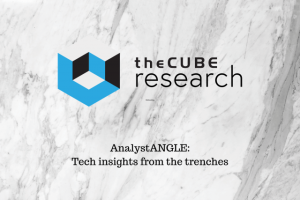A New Brand
I’m frequently asked “what is Hitachi Vantara?” At the recent Pentaho World event in Orlando I had an opportunity to dig deeper into this question. I sat down with President and COO Brian Housholder on theCUBE. I’ve known Brian since the late 1990’s. He’s a sharp exec with a strong vision and nose for execution.
Householder has been with Hitachi Data Systems (HDS) for fourteen years. As one of its top execs he’s been faced with some big challenges. HDS historically has been an infrastructure player with a heavy emphasis on storage and virtualization. For years it competed by having the best product and top gun price/performance. HDS was a perpetual thorn in the side of market leader EMC. But when EMC got to market first with flash storage on its aging Symmetrix line, its price/performance disadvantages relative to HDS were lessened. Enter the cloud and the effects of open source software on infrastructure pricing and HDS had to pivot.
The company has been transforming, slowly de-emphasizing storage and shifting its model to software and services, often through acquisitions. The most notable M&A move (to me) came in 2015 when the company acquired analytics specialist Pentaho. It seemed like a stretch for HDS, but the company was looking ahead and realized that analytics and the edge were on a collision course. Lacking a public cloud play, Hitachi decided to marry analytics with its industrial business to compete with the like of GE in the trillion dollar plus IIoT business.
It took two years for Hitachi to coherently explain its plans and Pentaho World was a logical forum to re-emphasize the strategy behind a new branding campaign that was announced this past September. Here are some excerpts of my interview with Brian Householder.
What is Hitachi Vantara?
In short, Hitachi Vantara is all about transformation. Householder explains in this clip that the company has been transforming for more than a decade. The key talking point: “From Edge to Outcomes.”
What’s with the Name?
Many people joke about the new name so I asked Householder what it meant and why they chose it. He explained in this clip that as a global company, they felt it was important to have a suggestive name. Vantara– the name is intended to evoke advantage (for customers), vantage point, insights from data and a shout out to HDS’ historical position in virtualization with the V.
Shift to Software & Services
According to Householder, fourteen years ago, 80% of HDS revenue came from hardware. In this clip, Householder claims that today, “sixty percent of our revenue comes from software and services. We still provide the infrastructure for companies but it’s much more around how does that infrastructure help drive your data strategy.”
What Open Source Means for Ecosystem & Go to Market
More than ten years ago, just after Hadoop was created, Pentaho acquired Weka, an open source data mining project. Pentaho’s open source commitment allowed the company to leverage communities early in its history. This is much different than the roots of HDS, both culturally and from a go-to-market perspective. In this clip, Householder explains that the strategy is to make open a centerpiece but build value on top.
Where does Hitachi Add Value?
To me this question is critical. With a $3B annual R&D budget I wanted to understand the margin model and how Hitachi adds value in an open source-led world. On this point, Householder was clear (video clip) that open source is difficult and Hitachi Vantara does well in the Global 2000 by helping minimize complexity. Often, large global customers will leverage open source but ultimately want the support and service of a player like Hitachi to integrate solutions.
Who Owns the Data?
A real hot button in the Wikibon community these days is intellectual property and data ownership. Every vendor says “it’s your data” when asked this question but there are gray areas. For example – if my data is used to train a model will that model (i.e. my IP) somehow seep into the hands of my competitors? Or if there’s a device on the factory floor that is collecting data – perhaps using AI for predictive maintenance, who owns the data coming off the device – the device manufacturer or the factory? In this short clip, Householder addresses the issue.
From Edge to Outcome
This phrase was a key underpinning of the narrative at Pentaho World. In this clip I ask Householder to describe Hitachi Ventara’s point of view on the edge. His key point was there will be analytics at the edge, which is logical. But I wanted to dig deeper to understand his view on the data model/pipeline that will emerge with edge computing. In this clip, we discuss a three-tier data model for IoT. Edge–>Gateway–>Cloud (Public & Private).
The research team at Wikibon has been working on a data taxonomy for edge-related systems which is consistent with this view.
Priorities for Hitachi Vantara
I closed by asking Householder where he’s focused and his answer in this clip really boiled down to customers, team and culture.
Check out the curated full interview below. You can scroll through playlist we’ve created to play the video snippets.


